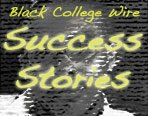| 51 Prairie View Students Isolated for Flu |  |
 |
 |
| By Ryan Rudd -- Black College Wire | |
|
Prairie View A&M University continues its efforts to neutralize the spread of the seasonal flu which has become an ongoing problem among the students. The Owens-Franklin Health Center has had a high number of students in and out of the facility being treated early for the influenza outbreak. 
Prairie View Panther
Protective masks seen on campus
"Of the 51 students placed in isolation, 32 of them have been documented to return to class," said Thelma J. Pierre, administrator of the Owens-Franklin Health Center. Things seem to be looking up in University College as well. Shandon P. Neal, director of student and residential life, is very pleased with the progress of this situation. "It has really calmed down. We've had only a couple of new cases since the second week of class began, " Neal said, "We had 44 students isolated, and the majority of them in our facility have gotten past their sickness and returned to their normal class cycle." Surprisingly, there have been six new reported cases of influenza. Pierre said there were two cases of H1-N1 confirmed in the week of August 31, but luckily those have been resolved. According to Pierre, the flu season is typically from October to March, but H1N1 spreads so rapidly it really has no ending point. Once available, the health center is scheduled to receive the H1N1 flu virus vaccine from the Centers for Disease Control. "All essential medical personnel in the nursing program on PV's Houston campus, are designated to take H1N1 vaccine," said Dr. Betty Adams, dean of nursing, and she is currently in communication with university officials to carry out processes needed when the vaccine is available. According to Adams, the vaccine should eliminate the H1N1 flu virus upon entering the affected body. "Avoid crowded areas as much as possible, and avoid traveling for 24 hours after sickness is gone," Adams advised. He also said, "It is not sanitary to sneeze on your shoulder, or your upper arm area. If you keep sneezing into your arm, you are simply spreading germs into your garments. Those germs then make their way back into the air, and eventually spread." As the university continues to manage the situation, the health center is raising students' awareness by providing accurate information on staying healthy while on campus. Barbara Dixon, a nutrition professor, offered her insight on staying healthy. "We strongly recommend that students eat according to the Food Guide Pyramid, which provides information on the right amount of nutrients that help build immune systems." Dixon stressed that students in college should learn to assume responsibility for their own health. Dixon said, "It is very important because the bottom line is that it is your responsibility to stay aware of your health. Here in the nutrition department, we teach our students to exemplify the things that they are taught in class." Pierre noted that the health center needs help from students, professors, and university staff to protect our institution of learning from this type of threat. She urged the university community to assist in keeping the flu virus from spreading. Ryan Rudd writes for The Panther, the Prairie View A&M University student newspaper, which originally published this article. |
|
| Posted Sep. 23, 2009 |
| < Prev | Next > |
|---|



